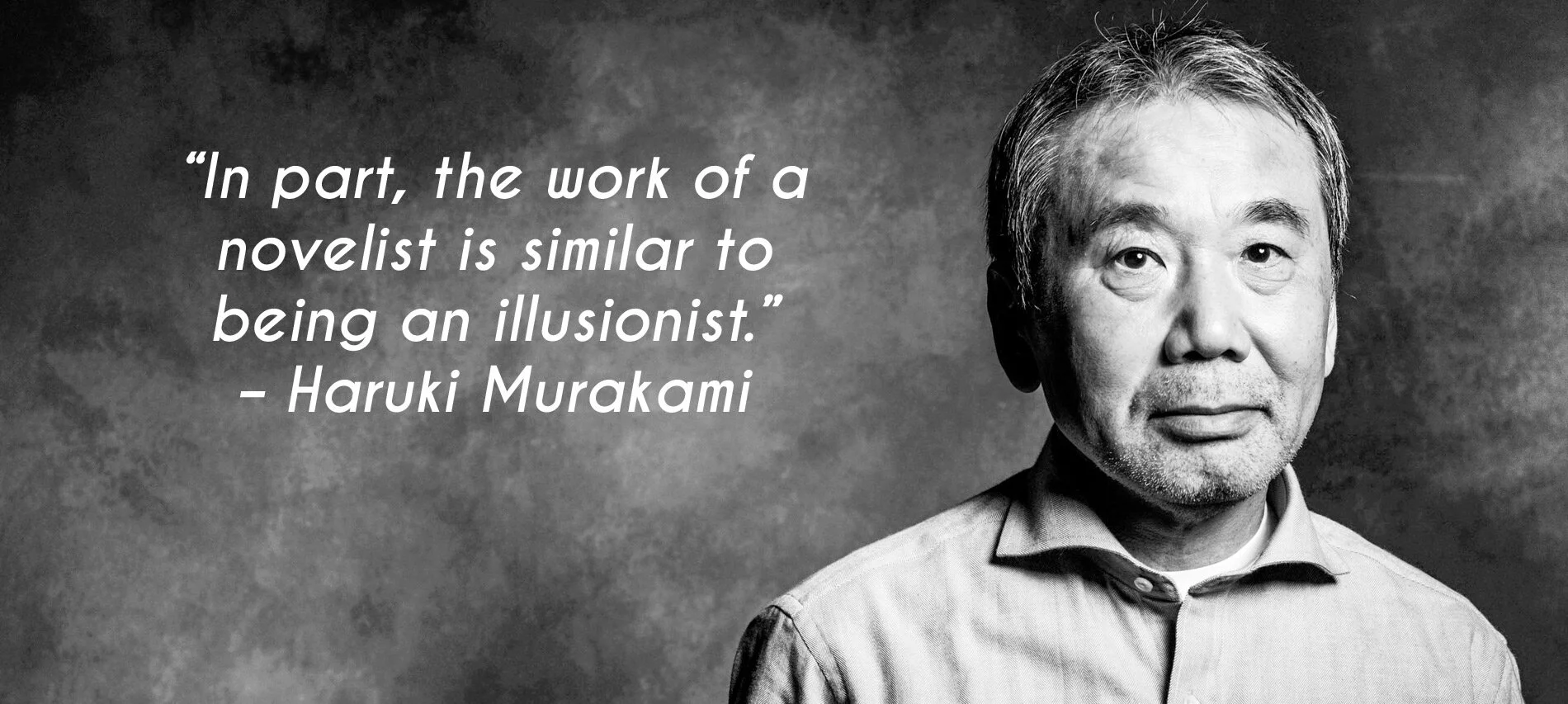Life Within The Lines | How Author Murakami Draws On Experience
Murakami takes messy, middling and monotonous themes, then transforms them into magical, mystical and magnificent writings.
His early life contains the essentials for the entirety of his fictions, using a narrative to allude to his experiences.
His protagonist’s actions and decisions are the vessels of his story’s unfolding, inventing an entirely new reality from his own.
Murakami possesses all the intentions of writing from his being.
Profit has never been the primary motive for his words. His drive is to serve as a guiding force for his readership.
He works with a lyrical rhythm that flows throughout his novels, alongside the same melancholic and dramatic tone that explore aspects of life in a multidimensional narrative.
The Role of Storytelling is to Help Readers Feel Sensations of Reality, Murakami
If the highly coveted author was to tell us how he creates stories that touch on life, it would go something like this:
Upbringing
"I didn't want to be a writer, but I became one."
Haruki Murakami
reddit.com
Marrying his wife. Starting work. Finishing school.
The path in which Murakami followed completely went against the flow of what was considered the norm in Japan.
Dreading office life, Murakami felt the burning desire to be his own boss and dictate the vibe of his new workspace.
He established a happy-go-lucky place that would allow his patrons to enjoy a cigarette under dim sunset lights while listening to live jazz classics as they sipped on their fine Japanese whiskeys.
A raucous venue day and night is an unadulterated source of quality anecdotes… and an unending deliverer of unrelenting hangovers.
After working tirelessly, Murakami, eager to clear his clouded mind, escaped from the shackles of work to enjoy the pleasures of a baseball tournament.
The batter slammed the first pitch.
A thunderous kiss resounded throughout the stadium when ball met bat - and with that satisfying crack, a sudden thought echoed through his mind:
“I think I can write a novel.”
His life, drastically and permanently altered when the batter belted that beautiful ringing double.
“Was it a revelation? An epiphany?”
“I didn't know then, and I don't know now.”
Whether his works are his more realistic or fantastical–Murakami often deals with the same set of philosophical issues, such as time and memory; the journey to the unknown; and the nature of evil.
Storytelling and Productive Distance - Haruki Murakami
Time & Memory
It’s circular in nature.
flicker.com
Murakami's characters feel a sense of deja vu.
A feeling of utter confusion and familiarity are themes that dominate his writings. It connects with his sense of doubt after his epiphany of being a writer.
He toys with the notions of familiarity. Having relived long-buried memories for characters, he begs the question: “Is what we remember, real?”
“Does the fidelity of the memory make it real?”
Do people have freedom, or are our actions already predetermined?
Journey to the Unknown
“When we move out of our every day world we discover ourselves anew.”
Haruki Murakami
reddit.com
The journeys that take place in his books often foreshadow major character revelations.
Murakami, himself, fell into literacy – a realm completely different from his beginnings.
His journey took him to discover a style of writing that he could confidently call his own.
The Nature of Evil
“There’s no such thing as perfect writing, just like how there’s no such thing as perfect despair.”
Haruki Murakami
reddit.com
Evil it seems, after reading Murakami's novels, is something external to the human condition.
Rather than a sticky piece of dirt, evil is more of a stain that blurs a character’s perception.
A stain that can be washed away to make the character "pure".
Indeed, Murakami had to wash away the conformity of a writers expectations - an evil that every writer has to overcome.
Triumph allowed him to be true to himself.
Become the Illusionist
Every one of his books follows the same philosophical thread;
Time and memory. The journey to the unknown. The nature of evil.
Basing stories on experience, elevates ones writing to another level.
Indeed, real experience is the gateway to the unbelievable.
Create layers.
Hint at life.
Don’t waste your words on something that will leave the reader with a bland aftertaste.
Stray from the norm.
Murakami is never one to shy from away this.
Unique experience sets him apart.
It’s the secret to creating something magical, mystical and magnificent.
It’s the key to becoming the illusionist.
The Belief in “Power of Storytelling” Drives Haruki Murakami






